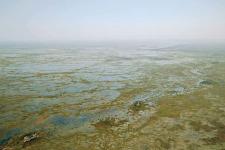Geopolitics in the Sudd

Counterinsurgency, empire, and state-building rely not only on human action but also work through the built environment. Building roads, bridges, dredging swamps is often both a precondition for and symbolic element in cementing external control over people and territory.
Oftentimes, however, landscapes themselves seem to resist such infrastructure-mediated interventions. James C. Scott has seductively argued how mountains have historically formed formidable bulwarks against expanding states, offering communities wishing to avoid encroachment the protection afforded by the ‘friction of terrain’. But mountains aren’t the only landscapes fundamentally intractable to infrastructural forms of power projection.
Transport historian Jacob Shell has developed a nice ‘color wheel’ of geophysical conditions where the logistical trappings of states simply have little traction.
In a new article for Geopolitics, DIIS researcher Peer Schouten & Jan Bachmann from the University of Gothenburg explore the political ecology of statebuilding and resistance in one of these settings: the Sudd, one the largest wetland in the world. Besides a fascinating biodiversity hotspot, it has also formed a formidable natural buffer against over a century of state-building efforts by subsequent outside claimants to power, ranging from the British Empire, Egyptian government engineers, Sudanese rulers, and, today, South Sudanese ruling elites.
In their article, Schouten & Bachmann explore not only how such efforts—often literally—got stuck in the mud of the Sudd, but also how communities have sought to strategize the ecological features of the marshlands to resist outside powers. Building on the political ecology and wider social theory on terrain, resistance and warfare, they conceptualize the Sudd as a lively political ecology – one characterized by constant struggles and accommodations between the centripetal logics of state-making and the centrifugal propensities of vernacular political culture.
DIIS Experts

